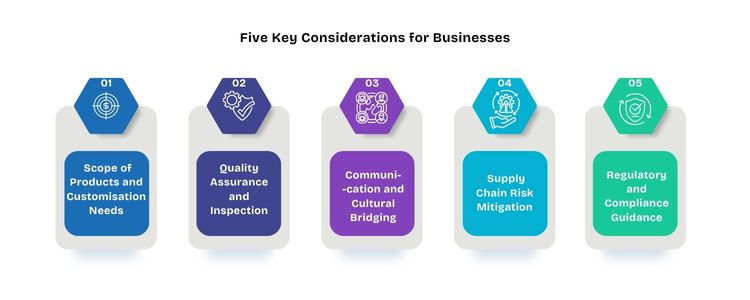Sourcing Agent vs. Manufacturer: Which Is Better for Your Business?
Navigating Global Procurement Choices in a Competitive Era
As global supply chains continue to grow more dynamic and regionally diversified, they have prompted an important question for any business, namely, should businesses work through a sourcing agent in India or engage directly with a manufacturer?
The answer is not the same for every company. It often depends on the size of the operation, the type of product, compliance regulations, and level of quality management required. Due to the increasing complexity of product development, compliance protocols, and market requirements, global buyers are reconsidering how they should structure their vendor relationships.
This article shows the practical distinctions between both models, their advantages, and their disadvantages in order to help you make the best decision especially if your company is involved in export sourcing agent India services or is exploring long-term relationships with global sourcing companies.
Understanding the Role of a Sourcing Agent in India
As a local intermediary between the buyer and a range of vetted manufacturers, a sourcing agent in India is a repository of market intelligence, language skills, and operational insight into a place where the buyer does not have local boots on the ground.
They reduce friction and increase control for a foreign buyer in what has been known in the international trade industry to be a very complex and opaque process, from discovery of vendors to compliance audits, quality checks in real-time.
Many export sourcing agent India companies will help the buyer manage shipping documentation and regulations for governments that buyers from overseas often stumble upon when they deal with factories directly.
Sourcing agent services are uniquely positioned to be helpful to small and mid-size enterprises seeking to break into complex categories like Indian handicrafts, customized footwear or home décor. In these categories, access to factories can be ambiguous and quality can vary widely.
The Direct Manufacturer Route: Pros and Caveats
Working directly with a manufacturer might be the easier and cheaper option—especially if you’re working with higher quantities and you’ve got precise and defined technical specifications. You may get a better price per unit through direct access, some cases even quicker production turnarounds.
But the lack of an intermediary also means you lose an accountability layer. Managing multiple vendors, resolving production mistakes, and checking quality control—especially regarding time zones—can be a costly and time-consuming activity.
This model may work for bigger businesses with established sourcing teams, or may have long-standing relationships with trusted leather manufacturers or apparel exporters. But for newer or smaller brands this may be risky considering the potential lack of local knowledge and bargaining power.
Five Key Considerations for Businesses
1. Scope of Products and Customisation Needs
Sourcing agents can work in many different product categories, interpreting needs across footwear sourcing company outputs to artisanal crafts. Because manufacturers focus on a specific line of products, they may not always exhibit the flexibility needed for multi-category purchasing.
2. Quality Assurance and Inspection
Sourcing agents conduct quality checks at mid-production stages and before shipping. Manufacturers may conduct such inspections as part of their production processes upon request and/or for an extra charge—this makes the sourcing agent particularly valuable for ensuring defect-free delivery.
3. Communication and Cultural Bridging
A frequent bottleneck to successful direct manufacturing relationships is miscommunication. Sourcing agents help eliminate cultural and language barriers to ensure buyer wants are understood and realised.
4. Supply Chain Risk Mitigation
Reliance on a single manufacturer in uncertain global markets can create disruptions. Agents, often affiliated with global sourcing companies, can explore contingency sourcing options or secondary lines of production in a timely substitute manner.
5. Regulatory and Compliance Guidance
Paperwork mistakes can hold up shipments from India or cause financial penalties when exporting from India. A detailed export sourcing agent India can deal with the paperwork with ease, especially when it comes to HS codes, certification of inspection, or taking advantage of FTA.
What Works Best for Your Business?
- Choose a Sourcing Agent If:
- You’re new to sourcing from India
- You require assistance with quality control, sampling, or logistics
- You want access to a variety of suppliers across different product lines
- Your volume doesn’t yet justify direct manufacturer commitments
- You’re new to sourcing from India
- Choose a Manufacturer Directly If:
- You have longstanding relationships or a local team in India
- Your order volumes are large and consistent
- The product is highly technical and specification-driven
- You have longstanding relationships or a local team in India
Many mid-sized importers start with an agent, build supply chain experience, and eventually establish direct factory relations through those networks. Some maintain both models—keeping agents for new product lines and managing key suppliers directly.

The Final Word: Strategic vs. Transactional Thinking
As we look ahead to 2025, the pace of change in the procurement landscape is evident, and organizations are harnessing new strategic sourcing models that promote convenience, accountability, and long-term value instead of mere costs gains. Whether you choose a sourcing agent in India, or to deal directly with a manufacturer, the decision should be based not simply on price, but all the way through the life cycle of your product journey.
Leading global sourcing companies understand that an agent’s role is more than procurement; it’s about protecting quality, enhancing supplier responsiveness and ensuring your brand image is not at risk in any market.









